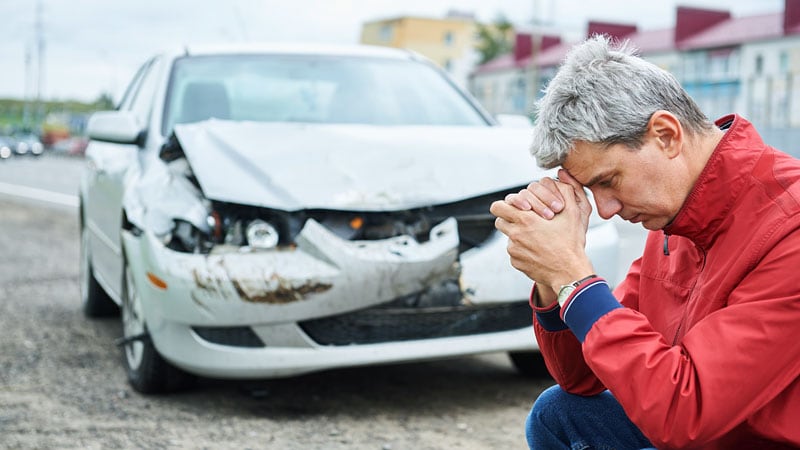Individuals diagnosed with young-onset dementia (YOD) have an alarmingly high risk of serious injury because of motor vehicle accidents — both as pedestrians and drivers.
Results from a longitudinal, registry-based cohort study showed that compared with the general population, YOD patients had an almost twofold increased risk of MVA-related injury.

Dr Jiun-Yi Wang
“These findings suggest that transport safety should be reinforced for patients with young-onset dementia,” study investigator Jiun-Yi Wang, PhD, professor and chair, Department of Healthcare Administration, Asia University, Taiwan, and adjunct professor, Department of Global Community Health and Behavioral Sciences, Tulane University, New Orleans, Louisiana, told Medscape Medical News.
The findings were published online May 5 in JAMA Network Open.
High Rate of Internal, Intracranial Injury
Much of the previous research exploring the association between dementia and risk for motor vehicle crash injury (MVCI) had limitations that potentially led to biased risk estimates, the investigators note.
Many of these studies used self-reported traffic crashes; had relatively small sample sizes and short follow-up periods; did not distinguish whether the crash party was a driver, pedestrian, or passenger; did not distinguish whether the vehicle types were cars, motorbikes, or bicycles; or did not consider length of time since a dementia diagnosis, Wang said
In addition, most previous research focused exclusively on older dementia patients, he added.
For the study, the researchers identified 39,344 individuals aged 40-64 years with new-onset dementia. They also randomly selected a matched reference group of the same size. Of the 78,688 study participants, 59.8% were men and the mean age was 54.5 years.
Researchers used data from Taiwan’s Police-Reported Traffic Accident Registry (PTAR), which collects information on the date and cause of an accident, type of vehicle, and whether the victims were drivers, riders, passengers, or pedestrians.
They cross-matched PTAR data with that from the National Health Insurance Research Database to identify hospitalizations because of MVCI.
The study adjusted for sex, age, socioeconomic status, urbanization, and comorbidities.
During a 10-year follow-up period, the incidence rate of MVCI-related hospitalization was 45.58 per 10,000 person-years among participants with dementia and 24.10 per 10,000 person-years in those without dementia.
Compared with those who did not have dementia, participants with dementia were at higher risk for MVCI-related hospitalization (adjusted hazard ratio [aHR], 1.83; 95% CI, 1.63 – 2.06; P < .001).
The investigators also evaluated the association between dementia and hospitalizations based on type of injury. The highest aHR was in those with intracranial or internal injuries (aHR, 2.44; 95% CI, 2.02 – 2.94; P < .001).
When assessing the association for different modes of transport, they found the highest risk for hospitalizations was for pedestrians (aHR, 2.89; 95% CI, 2.04 – 4.11; P < .001).
Researchers also examined the Injury Severity Score (ISS), which ranges from 0 to 75. A score of 16 or higher indicates major trauma. The aHRs were 1.68 for those with an ISS less than 16 and 2.90 for those with an ISS of 16 or higher (P < .001 for both).
In addition, the aHR for MVCI-related hospitalization for patients with dementia was highest within the first year after diagnosis (aHR, 3.53; 95% CI, 2.50 – 4.98; P < .001). The aHR was progressively lower further out from the diagnosis.
Dangerous Driving
A number of factors may explain the increased risk for a crash-related injury in those with dementia, the investigators note. They add that dementia can impair function necessary for safe driving and walking, such as memory, attention, executive function, judgment, hand-eye coordination, and reaction time.
Individuals with dementia are also more likely to have medical comorbidities that may increase crash risk and lower socioeconomic status, which has been linked to increased dangerous driving behaviors. They may also live in more rural areas that have relatively poor road conditions and require longer travel times, the researchers note.

Dr Chih-Ching Liu
As traffic crashes are associated with considerable economic and health costs, it’s important to identify individuals at high risk and provide them with educational interventions, lead study author Chih-Ching Liu, PhD, assistant professor, Department of Healthcare Administration, Asia University, told Medscape Medical News.
“Our study can serve as a beneficial reference for the planning of strategies for preventing transport crashes among patients with young-onset dementia,” she added.
Based on these findings and previous studies, the researchers recommend that clinicians routinely assess driving fitness of patients with memory issues.
It is also essential that they schedule regular follow-up examinations for these patients and inform drivers with dementia about MVCI-related hospitalization risks and the possibility that they will eventually have to stop driving.
In addition, when patients with dementia can no longer drive, proper social supports should be put in place to help prevent related psychosocial problems such as social isolation and mental health concerns, the investigators note.
No Guidelines?
Commenting for Medscape Medical News, Rajesh R. Tampi, MBBS, professor and chair, Department of Psychiatry, Creighton University School of Medicine and Catholic Health Initiatives, Health Behavioral Health Services, Omaha, Nebraska, said the study was well conducted.
The study’s strengths include the assessment of the different modes of transport, drivers vs passengers, and risks to pedestrians, said Tampi, who was not involved with the research.
He noted that because individuals with young-onset dementia often have severe neuropathology, “they will be at higher risk for any activity that involves complex and coordinated visuospatial and motor functioning, including driving, riding, and flying.”
Tampi cautioned the data are retrospective, so the study does not prove causality. In addition, he said he’s “certain” the findings would be similar if such a study was to be replicated in the United States or Europe.
Interestingly, he said he is not aware of any clinical guidelines governing drivers with young-onset dementia in the United States.
The study was funded by the Ministry of Science and Technology, Taiwan. The investigators and Tampi have disclosed no relevant financial relationships.
JAMA Netw Open. Published online May 5, 2022. Full text
For more Medscape Psychiatry news, join us on Twitter and Facebook
Source: Read Full Article
